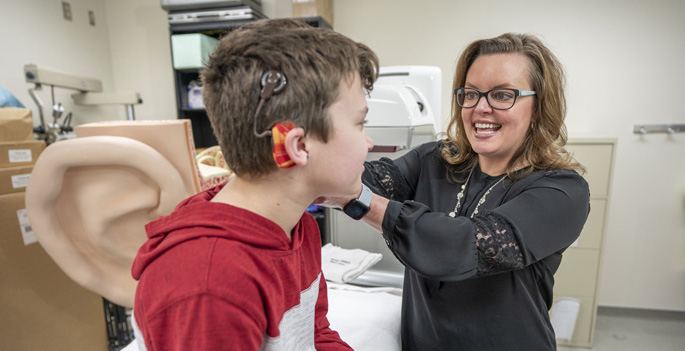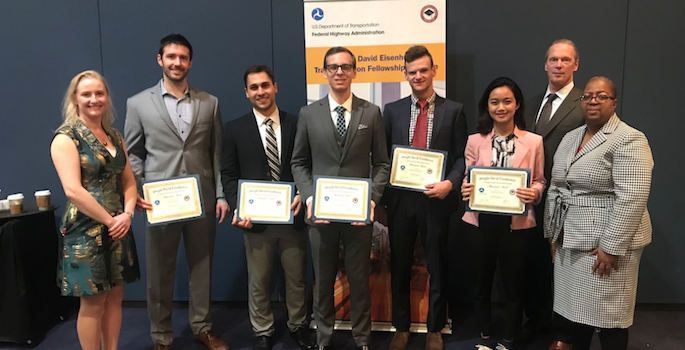Electrical Engineering And Computer Science
-

Team to create customizable cochlear implant programming
A team of Vanderbilt University and Vanderbilt University Medical Center researchers has received a $3.1 million National Institutes of Health (NIH) grant to develop advanced, patient-specific cochlear implant stimulation models for customized implant programming. Read MoreAug 6, 2020
-

Software suite expedites reproducible computer simulations
Science moves forward when researchers verify their and others' results. Read MoreJul 8, 2020
-

Adams to lead TIPs-funded, soldier-inspired innovation hub
A new innovation incubator will amplify existing collaborations among researchers and soldiers, building on Vanderbilt's partnership agreement with Army Futures Command. Read MoreJun 30, 2020
-

VISE researchers receive $3.1M grant for customizable cochlear implant programming
A team of Vanderbilt University and Vanderbilt University Medical Center researchers has received a $3.1 million NIH grant to develop advanced patient-specific cochlear implant stimulation models for customized implant programming. Read MoreJun 26, 2020
-

Data Science Institute big data model to help Monroe Carell Jr. Children’s Hospital prepare for patient needs during pandemic and beyond
Vanderbilt's Data Science Institute researchers are developing a model to use big data to address the impact of COVID-19 on policies, procedures, and resources now and in the future. The tool will help Monroe Carell Jr. Children's Hospital at Vanderbilt evaluate short- and long-term resource needs in order to be fully prepared to meet patients' needs. Read MoreJun 24, 2020
-

$3.3 million project aims to transform grid management with risk metrics for renewables
The goal of the project—Risk-Aware Market Clearing—is a blueprint for an end-to-end, data-driven approach that balances cost and minimizes system-level risk. Market clearing is the process that keeps the supply level to the demand with no leftover of either. Read MoreJun 17, 2020
-

Vanderbilt engineers mine EMRs and clinical journals for novel disease associations and new research paths
A new tool developed by Vanderbilt engineers, in collaboration with clinical and informatic experts, can unearth novel co-morbidities from routinely collected, anonymized electronic medical records. Read MoreFeb 18, 2020
-

Oguz uses ACCRE supercomputer daily for medical image analysis
For 17 years, Vanderbilt students and researchers have analyzed data with a method much faster than any normal laptop: a supercomputer steps away from the Commons Center. The Advanced Computing Center for Research and Education (ACCRE), which originated in 2003, is housed in the Hill Center. Read MoreJan 30, 2020
-

‘Film Detective’ helps kids with autism interpret actors’ actions
Maithilee Kunda and postdoc Roxanne Rashedi have developed a game called Film Detective to help adolescents on the autism spectrum learn to decode social scenarios. Read MoreJan 27, 2020
-

Five graduate students named Eisenhower Fellows
Five engineering Ph.D. students have received prestigious Dwight David Eisenhower Transportation Fellowships and one of them was named the top Eisenhower Fellow in the U.S. Read MoreJan 21, 2020
-

Neuromodulation device studied as non-addictive option for chronic pain
With $3.6 million in funding, researchers from the Vanderbilt University Institute of Imaging Science are developing a focused ultrasound neuromodulation device as a non-invasive and non-addictive method for treating chronic pain. Read MoreNov 11, 2019
-

Vanderbilt Rocketeers take on the 2020 NASA Space Robotics Challenge
A 25-member engineering team—13 seniors, 9 undergraduates and three graduate students—in the Vanderbilt Aerospace Design Laboratory is taking on the 2020 NASA Student Launch challenge. Read MoreNov 7, 2019
-

How to fake a medical record in order to mitigate privacy risks
In machine learning, generative adversarial networks (GANs) involve two artificial neural networks squaring off, one, the generator, trying to delude the other, the discriminator, into accepting synthetic data as real. Beyond their science and engineering applications, GANs can generate utterly convincing “photographs” of people who do not exist. Unrestricted use on a wide scale of... Read MoreNov 4, 2019
-

Vanderbilt team wins $1M in DARPA spectrum challenge finale
In a final five-minute flurry, MarmotE watched its lead slip. At the buzzer, the team placed second and won $1 million in the DARPA Spectrum Collaboration Challenge. The team of four researchers, now very close friends, have worked together since 2016 to create an AI-radio system that can manage the wireless spectrum, finding unused slices... Read MoreOct 29, 2019
-

Smart City project gives Nashville data-based planning tools
Vanderbilt researchers have discovered a vortex—and this one has nothing to do with icy, polar weather. Working with the Nashville Fire Department and Davidson County Information Technology Services, a team of Vanderbilt computer scientists and engineers analyzed more than three years of NFD incident data. The team looked at location, time and type of incidents... Read MoreOct 17, 2019
-

ORAU award supports BME professor’s work on whole brain statistical modeling
Mika Rubinov, whose research involves building statistical models of whole brain data sets, has received a competitive research grant from Oak Ridge Associated Universities. Read MoreAug 26, 2019
-

REDCap data management tool reaches million user mark
Developed in 2004 by BME research professor Paul Harris Fifteen years after it was launched, REDCap, Vanderbilt University’s research data management tool, has reached 1 million users throughout the world. REDCap, or Research Electronic Data Capture, is a web-based platform originally devised by Paul Harris, professor of biomedical engineering, biomedical informatics and biostatistics. To date,... Read MoreAug 22, 2019
-

REDCap data management tool reaches million user mark
Developed in 2004 by BME research professor Paul Harris Fifteen years after it was launched, REDCap, Vanderbilt University’s research data management tool, has reached 1 million users throughout the world. REDCap, or Research Electronic Data Capture, is a web-based platform originally devised by Paul Harris, professor of biomedical engineering, biomedical informatics and biostatistics. To date,... Read MoreAug 22, 2019
-

Chang receives Early Career Award for advancing fMRI data analysis
Catie Chang has received the 2019 Early Career Achievement Award from a society of the Institute of Electrical and Electronics Engineers. Chang, an assistant professor of computer science, electrical engineering and computer engineering, was honored this week at the IEEE Engineering in Medicine & Biology Society conference. Specifically, the award cites her “innovative contributions to... Read MoreJul 25, 2019
-

App prototype combines neural network, photos, burn patient info
Evaluating the severity of a burn injury – and whether it requires transfer to a Burn ICU or not – has been more art than science. About 79 percent of Total Burn Surface Area calculations are incorrect, sending more patients than necessary to specialized facilities, straining resources and compromising resuscitation and patient care. A senior... Read MoreJul 9, 2019